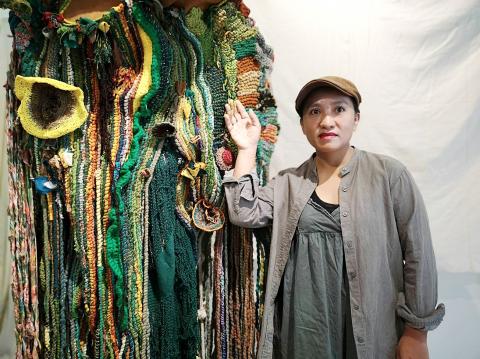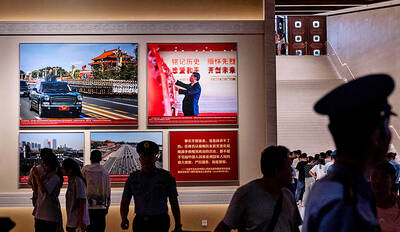Paiwan artist Aruwai Kaumakan said she was inspired to revive the art of Paiwan traditional weaving after receiving a dream vision from her ancestors following Typhoon Morakot in 2009.
Aruwai, who last year won the Pulima Art Festival’s grand award in the visual arts, on Monday opened an exhibition at Pintung University of Science Technology, where she studies fashion design and business management.
Utilizing traditional totems and elaborate scrollwork, her woven creations tell the stories of home and the lives of women, with her award-winning series of work. Pulse (脈動), prominently featuring the motifs of swirling river water and black slate tiles of Paiwan houses.

Photo: Chiu Chih-jo, Taipei Times
Daughter of the chieftain of Dashe (大社) village in Pintung County’s Sandimen Township (三地門) — one of the three communities devastated by the typhoon — Aruwai said she grew up immersed in the rituals and symbols that designated a woman’s social status in Paiwan society.
Her mother and grandmother, who she said were her first artistic mentors, taught her how to wear ceremonial headgear and clothes, as well as the meaning of each item, she said.
Her mother is particularly adept at taking apart traditional textiles and reassembling them into new creations, which inspired her to weave her creations using recycled cloth and other everyday fabrics, Aruwai said.
The scrollwork that appears in her creations as veins, butterflies and women’s ornamental hair pins is a technique she learned from jewelry designer Lee Fang-yu (黎芳瑜), she added.
“An artist needs to know where she comes from and where she is going to for her creations to soar,” Aruwai said. “More than a scion to an aristocratic line, I see myself as a torchbearer of my culture, which I embrace through creativity.”

Three batches of banana sauce imported from the Philippines were intercepted at the border after they were found to contain the banned industrial dye Orange G, the Food and Drug Administration (FDA) said yesterday. From today through Sept. 2 next year, all seasoning sauces from the Philippines are to be subject to the FDA’s strictest border inspection, meaning 100 percent testing for illegal dyes before entry is allowed, it said in a statement. Orange G is an industrial coloring agent that is not permitted for food use in Taiwan or internationally, said Cheng Wei-chih (鄭維智), head of the FDA’s Northern Center for

The Chinese military has built landing bridge ships designed to expand its amphibious options for a potential assault on Taiwan, but their combat effectiveness is limited due to their high vulnerability, a defense expert said in an analysis published on Monday. Shen Ming-shih (沈明室), a research fellow at the Institute for National Defense and Security Research, said that the deployment of such vessels as part of the Chinese People’s Liberation Army (PLA) Navy’s East Sea Fleet signals a strong focus on Taiwan. However, the ships are highly vulnerable to precision strikes, which means they could be destroyed before they achieve their intended

About 4.2 million tourist arrivals were recorded in the first half of this year, a 10 percent increase from the same period last year, the Tourism Administration said yesterday. The growth continues to be consistent, with the fourth quarter of this year expected to be the peak in Taiwan, the agency said, adding that it plans to promote Taiwan overseas via partnerships and major events. From January to June, 9.14 million international departures were recorded from Taiwan, an 11 percent increase from the same period last year, with 3.3 million headed for Japan, 1.52 million for China and 832,962 to South Korea,

REWRITING HISTORY: China has been advocating a ‘correct’ interpretation of the victory over Japan that brings the CCP’s contributions to the forefront, an expert said An elderly Chinese war veteran’s shin still bears the mark of a bullet wound he sustained when fighting the Japanese as a teenager, a year before the end of World War II. Eighty years on, Li Jinshui’s scar remains as testimony to the bravery of Chinese troops in a conflict that killed millions of their people. However, the story behind China’s overthrow of the brutal Japanese occupation is deeply contested. Historians broadly agree that credit for victory lies primarily with the Chinese Nationalist Party (KMT)-led Republic of China (ROC) Army. Its leader, Chiang Kai-shek (蔣介石), fled to Taiwan in 1949 after losing a